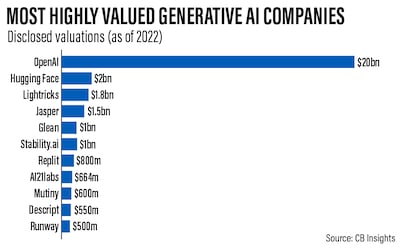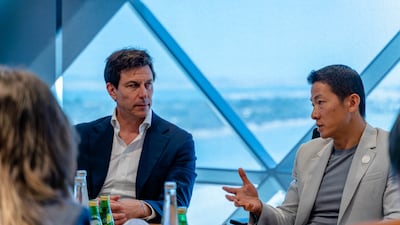Rapidly evolving generative artificial intelligence technology, with its “truly disruptive” nature, requires regulatory oversight, the chief executive of Abu Dhabi's AI company G42 has said.
Authorities must build “transparent” partnerships between the public and private sectors as well as academia to identify and address concerns surrounding the rapidly emerging technology, Peng Xiao told media in Abu Dhabi on Thursday.
“The difference between AI and any previous … technology we've ever seen is that this is one tool that can learn on its own and evolve on its own,” Mr Xiao said.
“And what we gathered in what I call the recent generative AI 'revolution' is that, increasingly, it can learn unsupervised.”
Putting a lid on the growth of generative AI could prove challenging potentially be similar to the boom in cryptocurrencies, which left regulators scrambling to figure out how to oversee the technology and enforce ethical and legal standards.
AI in business is not new, but it has significantly gained momentum with the advent of generative AI. The technology — made popular by the OpenAI's ChatGPT — can produce various kinds of data, including audio, code, images, text, simulations, 3D objects and videos.
While it takes cues from existing data, it is also capable of generating new and unexpected outputs, according to GenerativeAI.net.
Google's Bard, a rival to Microsoft-backed ChatGPT, made a factual error during a promotional video in February, days after it was launched, wiping out $100 billion in market value for its parent company, Alphabet.
In the same month, Microsoft's Bing chatbot caused alarm after it turned testy and even threatening — including speaking of desires to steal nuclear codes, create a deadly virus or to be alive.
Analysts and academics said it behaved that way because it was likely mimicking what it had learnt from online conversations.
Billions have been poured into generative AI, and Twitter chief executive Elon Musk said earlier this month that he plans to join the race. He is aiming to develop a “truth-seeking” generative AI platform to challenge ChatGPT and Bard, the billionaire said.
“In the technology world, you tend to be artists to be more creative, but it also takes great discipline and a strong vision to succeed in the long term,” Toto Wolff, team principal of the Mercedes-AMG Petronas F1 team, said at the roundtable.

The team recently signed a multiyear partnership with G42 to explore ways to use AI solutions for its racing operations.
The deal also aims to create “real impact” beyond racing: the companies hope that the solutions developed as a result of the partnership will be utilised across broader AI use cases in other industries, Mr Xiao said.
“I require more trust between men and machine,” he said.
“The next level going beyond optimisation is actually autonomy to begin to make decisions in the absence or in support of humans — and this is more challenging.”


